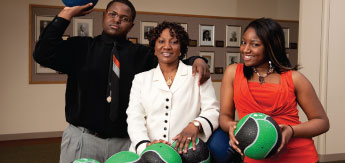What is the Community Health Leader Training?
This pilot project aims to train women as health leaders in regard to reproductive health and diseases of the reproductive system that disproportionately affect women of African descent. The training exposes these health leaders to a new dimension in the public discourse about the health and social challenges that women face in dealing with these diseases and associated burden. Specific goals include:
- foster a proactive learning environment that empowers these health leaders to advocate and organize for community-based health practices that address the diseases of reproductive system and social determinants of health and
- start a transformative movement of well-informed women and community members who can articulate their reproductive health concerns and needs to the medical establishments, public health institutions, political representatives, religious/social leaders, and the food industry.
Through a small grant from Mass General Hospital, Lilly Marcelin, founding Director of the Resilient Sisterhood Project (RSP) and BACH Steering Committee member, partnered with Dr. Karen Winkfield, an Oncologist at MGH to pilot this training with 10 diverse women. These women represent a range of ethnicities and ages. This training gives women the opportunity to focus on the chronic under-diagnosed and under-treated diseases of the reproductive system in women of African descent, as well as internalized stereotypes, stigmas and social perceptions of reproductive health. Another important aspect of this training is to address the pervasive culture of silence and secrecy around these diseases. Participants are eager to openly talk about these problems and after 18 hours of training these women can move on to be health leaders and advocates for community change.
What is included in the curriculum?
Topics covered include the basic anatomy and physiology of the reproductive system, basic information on the cell to the diseases of the reproductive system such as: uterine fibroids, endometriosis, polycystic ovarian syndrome, infertility, and the gynecological cancers—breast, cancer, endometrial, and ovarian. In addition to reproductive health issues, discussions around other diseases, such as colon cancer, diabetes, and high blood pressure, are also included.
This work not only focuses on reducing inequities, but to connect clinical providers with community residents. The training course engages medical professionals, public health leaders, nutritionist, environmentalists, stress reduction specialists, and community activists, with the goal of exposing health leaders to the breadth and importance of knowledge in regard to reproductive health and overall well-being. One guest speaker included a nuclear biologist to provide basic knowledge of the cells, anatomy and physiology of the body.
Training is supported by readings and documentaries such as: Unnatural Causes, Soul Food Junkies, and a host of other health documentaries in regard to reproductive health and social justice matters. In addition, participants also visit various neighborhoods to explore environmental and food concerns.
Next Steps
After the pilot program is complete, RSP hopes to develop a curriculum with a plethora of resources for residents to continue training others as health leaders. Participants can then take the knowledge learned to their communities including churches, schools and social groups.
More about the Resilient Sisterhood Project
RSP is an emerging nonprofit based in Boston to raise awareness and empower women and young adults of African descent. Their mission is to inform these women about common but rarely discussed diseases of the reproductive system that disproportionately affect them. RSP approaches these diseases and associated issues through a cultural and social justice lens.

